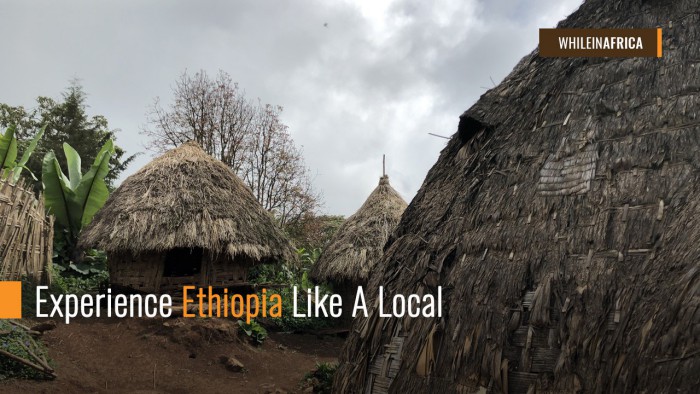If you travel to Ethiopia with a tour operator, you can expect to follow the standard tourist routes. You’ll see the same things as everyone else and will miss out on the “real” Ethiopia.
To experience Ethiopia like a local, make sure to try some of the following experiences. If you’re committed to booking with a tour operator, ask to include them in your itinerary (you might even get a discount as they will probably be cheaper alternatives).
How to visit Ethiopia like a local
Experience a local coffee ceremony
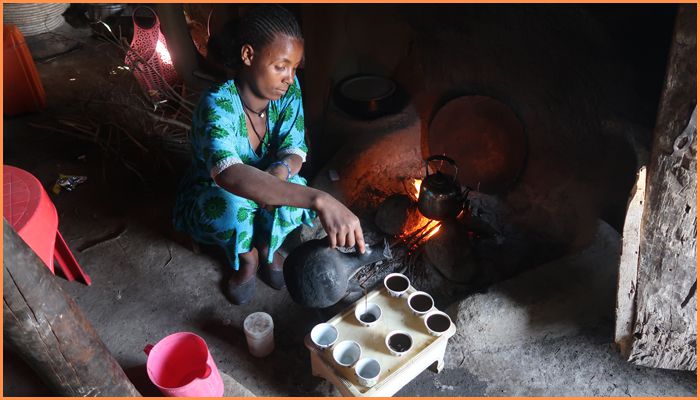
“Bunna” also known as the Ethiopian Coffee Ceremony
The Ethiopian coffee ceremony is a fascinating local tradition that plays both a social and spiritual role within the community. It’s a time when people unite to talk about friends, family or the latest local news. It’s a lengthy process that can take hours — but that’s the beauty of it. Typically, female hostesses will take unwashed beans and go through a careful process to turn them into a pot of coffee. If you’ve booked through a tour operator, your hotel may offer a Westernized-version of the process. However, to get the true experience, ask your driver or a friendly local to show you where they should go.
Learn how to make injera bread
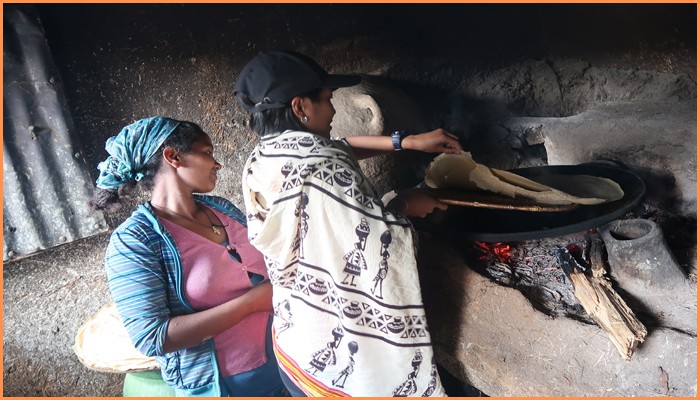
Erika tried to cook an injera bread herself
If you’re spending any length of time in Ethiopia, then you will undoubtedly come across injera. Almost ubiquitous, injera is a flatbread served alongside meals to add bulk. It may look like a fairly simple dish to create, but it takes a lot of practice to get it right. If you’re into cooking, then head to a small restaurant — preferably in a small town — and ask them to show you how to make it. You will learn how to make the batter (which needs to ferment for a few days) and then how to cook it on a round clay griddle. If you get it right, you’ll be left with a spongy piece of bread and an impressive skill to show off at your next dinner party.
Try some of the local Ethiopian cuisines
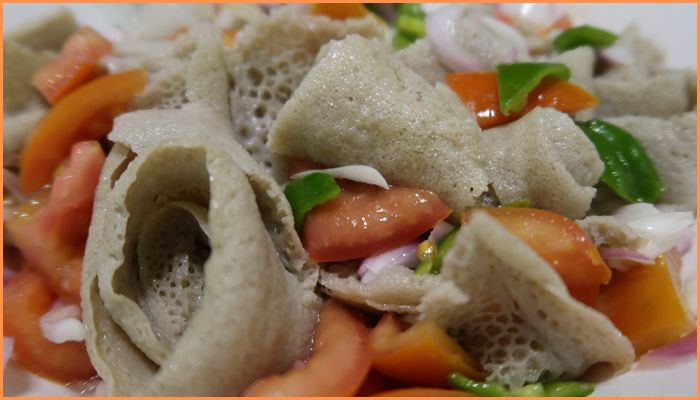
Injera with veggies and some spices
If you’ve booked with a tour operator, you may be tempted to stick to the hotel cuisine, but going local is a more immersive experience. Ask your driver to take you to their favorite local eatery or even eat with them. You’ll discover, Ethiopian cuisine is vastly underrated on the world’s culinary stage. Spice blends create a punchy flavor for many meals. Locals will eat food with their bare hands, something that is a must-try. There is also a gesture that locals do- they feed another by placing with one’s hand, a portion of Injera in the mouth of another, a sign of trust and friendship. You will probably come across Wat, an Ethiopian stew or curry, created with a variety of vegetables and, possibly, some meat as well. Your Wat will probably be served with Injera, which can be used to soak up some of the delicious sauces left at the end. You should also order Shiro, a staple food created from chickpeas, minced onions, garlic, and regional additions.
Learn how Ethiopians brew their beer
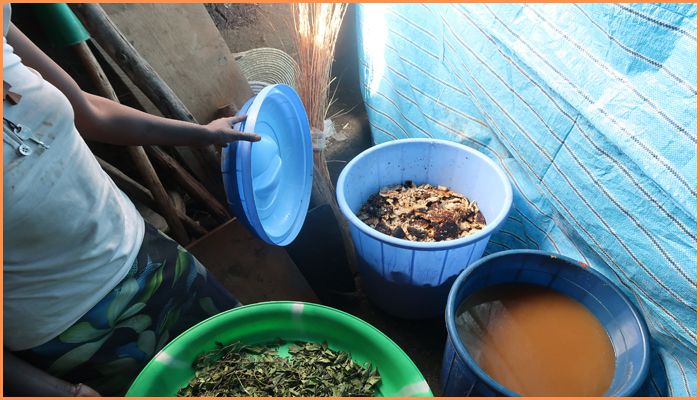
Tella is an Ethiopian home-made beer
Ethiopia has an extensive beer brewing history. Individual households fashion their own home-brews, called Tella, from local grains. However, the introduction of the St. George Brewery in 1922 marked a move away from a home-grown to a more mass-produced product. Although the most popular beer in the country is still the home-brewed beer, more and more Ethiopians are now opting for is micro-brewery produced beer. For an authentic Ethiopian experience, take some time out to try and get invited home to a local house to learn how they brew their beer. And while there, opt for a taste of it as well. You can easily spot if a house has homemade brewed beer ready as the custom is to place a cup on a small table outside their house, which means its readily brewed and for sale.
You can also explore one of the newly fashionable micro-breweries. You’ll discover a surprising range of boutique beers available that have been created using modern production techniques but blended with Ethiopia’s proud, home-brew history.
Stay with a local family

Our hosts while in Ethiopia
Staying within the manicured walls of your hotel is a perfectly acceptable way to spend a vacation in Ethiopia but, to truly experience it, you need to mingle with the people. Staying with a local family is a truly wonderful way to get an idea of how a local person lives. Websites such as couchsurfing.com allow you to get in contact with someone willing to open up their home for you. Alternatively, you could ask your tour operator to arrange a stay for you. The vast majority of Ethiopians are very hospitable — it’s ingrained within their culture — so don’t be afraid to have a sleepover at someone else’s house.
Learn the Ethiopian greeting
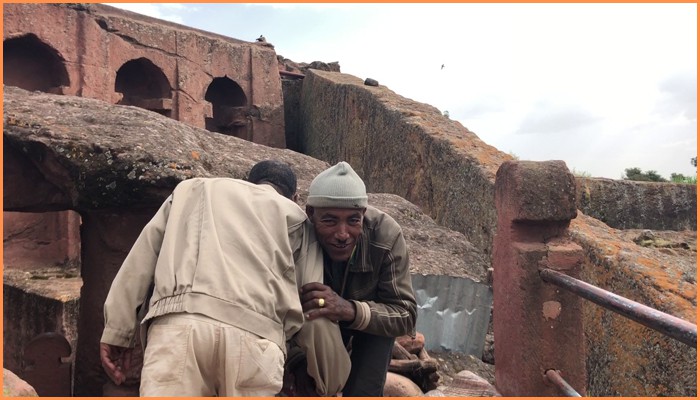
It’s common to lean in and touch your shoulders.
If you would like to experience Ethiopia like a local, then you need to learn how to greet people in locally. It’s normal to shake hands using your right hand while keeping eye contact. It’s then common to lean in and touch your shoulders. However, it’s all good just reading about it, but practicing it in a social situation is a completely different thing altogether. It’s also worth remembering that Ethiopia is an extremely culturally-diverse country and you should pay attention to that. It may not, for example, be acceptable to hug a member of the opposite sex who practices the Muslim faith or, perhaps, with someone you’re not yet acquainted with.
Visit the smaller tribes outside the Omo Valley
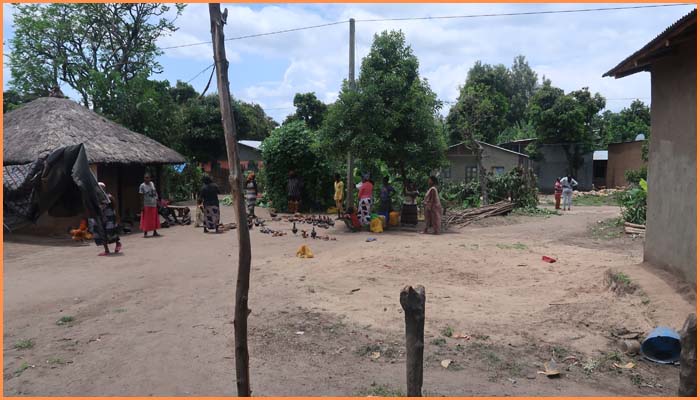
Ari Tribe neighborhood
When you visit Ethiopia, your tour operator may well take you to the Omo Valley to visit the tribespeople there. However, these spots can sometimes feel overrun with tourists, which can seriously harm your “local” experience. Instead, ask your tour operator to organize trips to less-visited tribes. For example, the Ari and Banna tribes that inhabit the Lower Omo Valley have fewer foreign visitors. This trend won’t last for long as tourists look for more and more “unique” experiences so make sure to visit while you can.
Go clubbing in a local nightclub

Nightlife in Addis Ababa
If you’re a bit of a night owl, Ethiopia — and particularly Addis Ababa — is a great place to go clubbing. Like most places in the world, you can expect young people dancing the night away. Music and rhythm play a big part in Ethiopian society, so, unsurprisingly, their nightclubs are full of activity. The quality of clubs, as in most countries, can vary enormously. Large hotel chains offer a more Westernized version, but the city offers shabbier (but more local) offerings.
Visit a tej bet
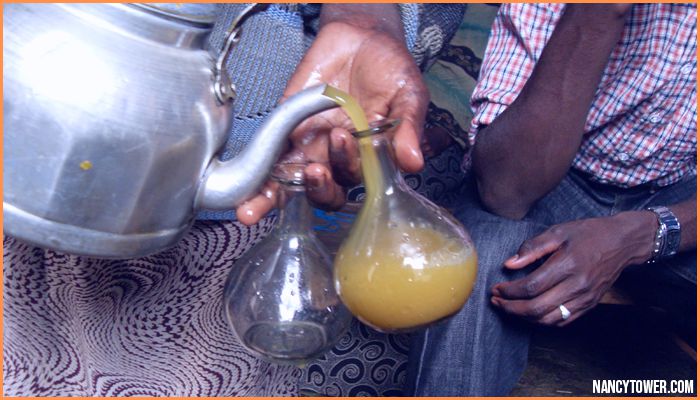
Ethiopian honey wine house
Honey wine is a national drink in Ethiopia and something quite unlike anything you may have experienced before. Very sweet to taste, it was once the drink of the upper classes, but now you can find people of all classes drinking in bars known as tej bets. To get the full experience, travel to Lalibela, a town in the north famous for the honey wine it serves. Your tour operator should know where to find a good tej bet but, as always, you can ask your driver for advice on a more local spot.
Look out for new opportunities
Finally, if you want to experience Ethiopia like a local then keep your eyes and mind open. If you see something happen that looks exciting then try to get involved. As mentioned before, Ethiopians are very welcoming and are normally more than happy for you to join in their celebrations. For example, we were lucky enough to witness a baptism in Lalibela. We approached the family to offer our congratulations and were invited to join them in their homes. It’s an exciting, open country with many opportunities; take advantage of them whenever you can.

